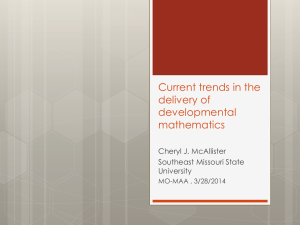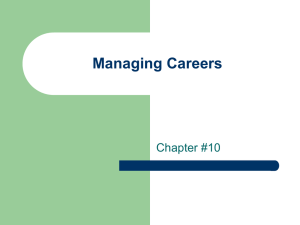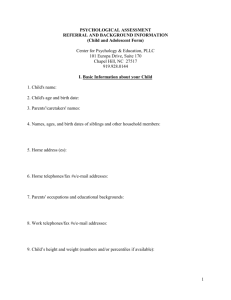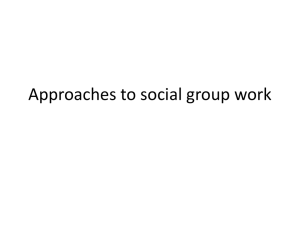Periodic Review of Academic Departments
advertisement
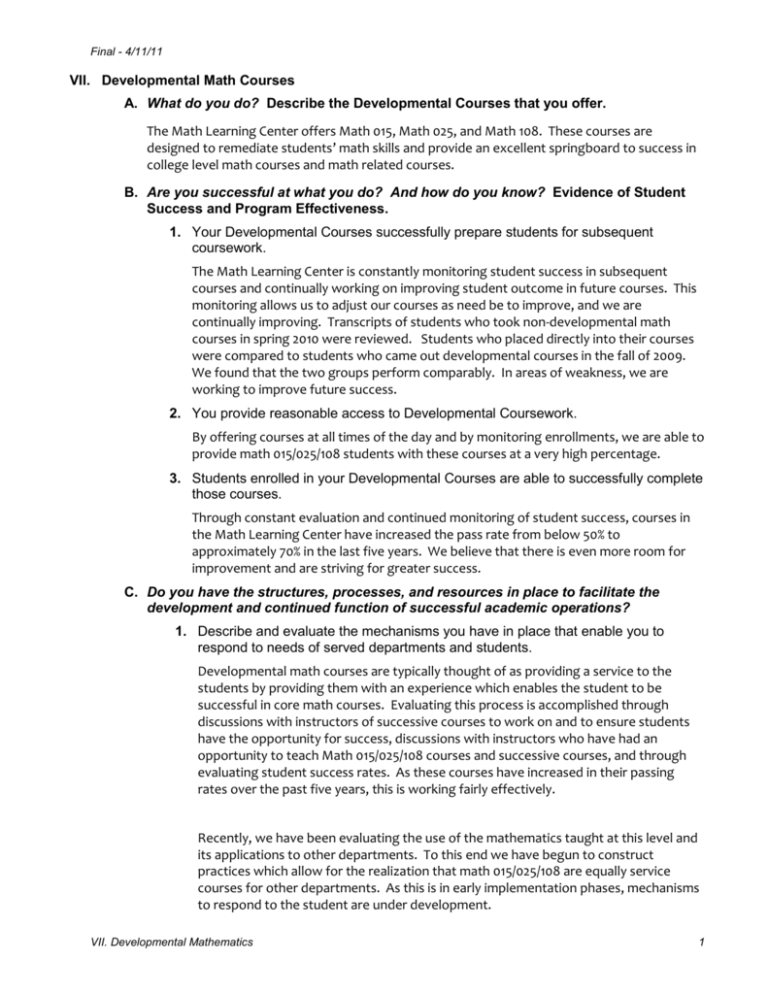
Final - 4/11/11 VII. Developmental Math Courses A. What do you do? Describe the Developmental Courses that you offer. The Math Learning Center offers Math 015, Math 025, and Math 108. These courses are designed to remediate students’ math skills and provide an excellent springboard to success in college level math courses and math related courses. B. Are you successful at what you do? And how do you know? Evidence of Student Success and Program Effectiveness. 1. Your Developmental Courses successfully prepare students for subsequent coursework. The Math Learning Center is constantly monitoring student success in subsequent courses and continually working on improving student outcome in future courses. This monitoring allows us to adjust our courses as need be to improve, and we are continually improving. Transcripts of students who took non-developmental math courses in spring 2010 were reviewed. Students who placed directly into their courses were compared to students who came out developmental courses in the fall of 2009. We found that the two groups perform comparably. In areas of weakness, we are working to improve future success. 2. You provide reasonable access to Developmental Coursework. By offering courses at all times of the day and by monitoring enrollments, we are able to provide math 015/025/108 students with these courses at a very high percentage. 3. Students enrolled in your Developmental Courses are able to successfully complete those courses. Through constant evaluation and continued monitoring of student success, courses in the Math Learning Center have increased the pass rate from below 50% to approximately 70% in the last five years. We believe that there is even more room for improvement and are striving for greater success. C. Do you have the structures, processes, and resources in place to facilitate the development and continued function of successful academic operations? 1. Describe and evaluate the mechanisms you have in place that enable you to respond to needs of served departments and students. Developmental math courses are typically thought of as providing a service to the students by providing them with an experience which enables the student to be successful in core math courses. Evaluating this process is accomplished through discussions with instructors of successive courses to work on and to ensure students have the opportunity for success, discussions with instructors who have had an opportunity to teach Math 015/025/108 courses and successive courses, and through evaluating student success rates. As these courses have increased in their passing rates over the past five years, this is working fairly effectively. Recently, we have been evaluating the use of the mathematics taught at this level and its applications to other departments. To this end we have begun to construct practices which allow for the realization that math 015/025/108 are equally service courses for other departments. As this is in early implementation phases, mechanisms to respond to the student are under development. VII. Developmental Mathematics 1 Final - 4/11/11 2. Describe the mechanisms you have in place to ensure that your coursework is of high quality. Through the use of technology, we are able to provide similar course work expectation in all developmental courses. As we discover changes that are necessary to produce better results, we are capable of creating appropriate changes in all classes immediately. This is effective. 3. Describe the mechanisms you have in place to ensure high quality instruction. Through the use of student surveys, evaluating coursework and evaluating success of individual instructors’ students in future classes, we have been able to improve the success of our students through instruction. It is difficult to judge the effectiveness of this process and it is under review. 4. Describe and evaluate the processes you have in place to enable effective planning of enrollments. The primary process is to set up courses to cover the load of 80% of the students enrolled in the previous year, then monitor the enrollment and add classes as necessary. This is effective as we are able to offer enough courses to meet students’ needs. 5. Evaluate the extent to which the department’s faculty, staff, space, budget, and other resources enable you to offer high quality service coursework. Currently we are improving with what we have. As always, more and better is desired. D. In what ways do you contribute? Describe the contribution of your service coursework to the success of the university’s academic programs. At this time, developmental math is just beginning to embrace the concept these courses are meant to enable greater success for university students in courses and programs outside the math department. We are increasing our contribution by making this goal a significant element of our course designs. E. How should you do things differently? What are your strengths and weaknesses? What are opportunities and threats? What actions should you take? 1. What are the strengths, weaknesses, opportunities, and threats that the department has in the realm of its service coursework? What are your thoughts on how you could capitalize on the strengths, remedy the weaknesses, exploit the opportunities, and guard against the threats? As developmental math courses are realizing that the material learned in these courses is playing an important part in the students’ education in an increasingly larger number of majors, our strength is a staff and instructors who understand the need to provide improved and relevant service. Along with the opportunity to improve curriculum, we are working to implement many ideas which will improve our service this fall. A weakness is the ability to catalog all of the unique uses of math in all of the subjects that are growing in their use of math and how the math is applied in each subject. We keep looking for avenues to open up communications but this is difficult due to time and university structures. The threat is change itself. Change is difficult in well established institutions such as universities. VII. Developmental Mathematics 2 Final - 4/11/11 We currently plan to take advantage of our strength in enthusiasm for improving educational opportunities while also working on serious evaluation to make sure that appropriate and effective change is created. 2. In what areas of your departmental operations would you like external reviewers to concentrate their efforts so as to give you the most valuable information for you to use to improve your programs? One area of assistance would be the ability to better evaluate student success in courses by large breakdowns of groups within the class structure (i.e. by ACT score, previous classes completed, time between one math course and the next, grades in previous classes). Data warehouse provides good data on class averages but changes are needed in order to look for groups where success is not occurring and fix problems related to these groups. A more important task for external reviewers would be to bridge departments. Over the last thirty years and due to technology, the use of mathematics has increased in many majors and the practice has changed in many cases from mechanical evaluation to mathematical interpretation of technologically driven results. Before math service courses can make significant inroads into these changes, we need to have a better evaluation of how mathematics is being used in today’s classes (outside the math department). Once this evaluation has been accomplished and appropriate changes have occurred in math service course, outside evaluation will be necessary to measure the effect of the changes in other departments. When positive change has occurred, it needs to be evaluated to find out if we can do better. And when negative change occurs, an outside reviewer can best determine where the difficulties actually occur. (E.g., Is the problem in the math service courses or in the major courses?) VII. Developmental Mathematics 3


